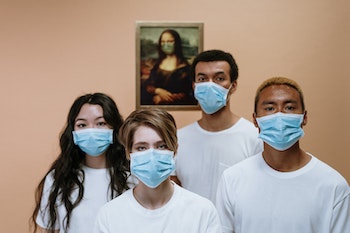By Celica Cook, SBM Student Life Editor
No one saw the COVID-19 pandemic coming. All over the world, people are suffering from the physical, emotional and financial effects of the coronavirus. Communities of color have been hit harder than most.
The Multicultural Council held an open zoom meeting onWednesday, April 22, addressing this issue. A panel of student speakers and Dr. Sarah Jones, Associate Professor of Nursing, spoke about how th COVID-19 virus has been affecting communities of color, specifically within the African American, Latino, and Asian communities.
There are a myriad of reasons why people of color have been feeling the effects of this virus more than the white community. One of these reasons is the concentration of workers or color in undervalued jobs.
“Workers of color are overrepresented in many of the low wage jobs,” Laura Almeida, Chair of the Multicultural Council said. “They are the most vulnerable to layoffs due to the coronavirus. It’s not only physically, but economically that people of color are getting disportionately affected by this.”
African Americans and Latino’s are dying from the virus at higher rates than white communities are. African Americans are at higher risk for chronic conditions that make their immune systems vulnerable. This is due to generations of environmental, political and economic factors that have negatively affected the African American community, according to a report by ProPublica.
In Illinois, African Americans make up about 15 percent of the population, yet 43 percent of the people who have died from the virus are African American. In Louisiana, a third of the population is African American, but 70 percent of the virus deaths are African Amerincans.
Latino communities face similar health concerns, as well as similar financial and job security concerns as African Americans. The current unemployment rate in the U.S. is 4.4 percent, yet Latino unemployment is at 6.6 percent, NPR reports.
Andrea Perez, LAL Tresurer, spoke on the panel about the COVID-19 effects om Latino communities, specifically legal and undocumented immigrants.
“Latino’s make up almost three-fourths of the estimated 10.5 million undocumented people living in the U.S.,” Perez said.
Though undocumented workers still have taxes deducted from their paychecks, they are not benefitting from unenployment or stimulus checks. As of now, California is the only state that has made funds available for undocumented immigrants.
Unaccompanied migrant children are being affected as well. While they were once protected by the law, they are now being turned away as the laws that protected them before are being put aside in fear that bringing migrants in will spread the virus.
“To prevent more outbreaks and spread, they’re turning people away, even legal asylum seekers, which is their right to seek asylum in this country,” Perez said.
Asian Amerincans have been facing challenges with the virus as well. Fatima Jan is the ASA president. She spoke during the discussion about the racism and hate that Asian Americans are facing as a result of the virus.
“It’s really underrepresented in the news,” Jan said. “You don’t ever hear about the story of the Singaporian male in London that was beat up at a train station.”
Asian Americans have been facing racial discrimination as a direct result of the virus. The coronavirus has also been called “the Chinese Virus” on social media which has caused widespread xenophobia against Asian Americans. Hate crimes towards Asian Amerincans have been on the rise and many Asian businesses are also suffering as a result.
The attacks against the Asian community is a direct result of ignorance and xenophobia. While social media has fueled the fire for these racist attacks against Asians, there have been campaigns against these racist attacks. Hashtags like #iamnotcovid19 and #racismisavirus helps Asians and allies to speak up against injustice, and give voice to the serious issues they are facing.
“A lot of people are taking to social media,” Jan said. “Social media influencers especially have been speaking out. I think the only way to combat anything is to bring awareness to it, and when a bunch of people come together to support a people group, that is the one of the only ways we can combat this.”


